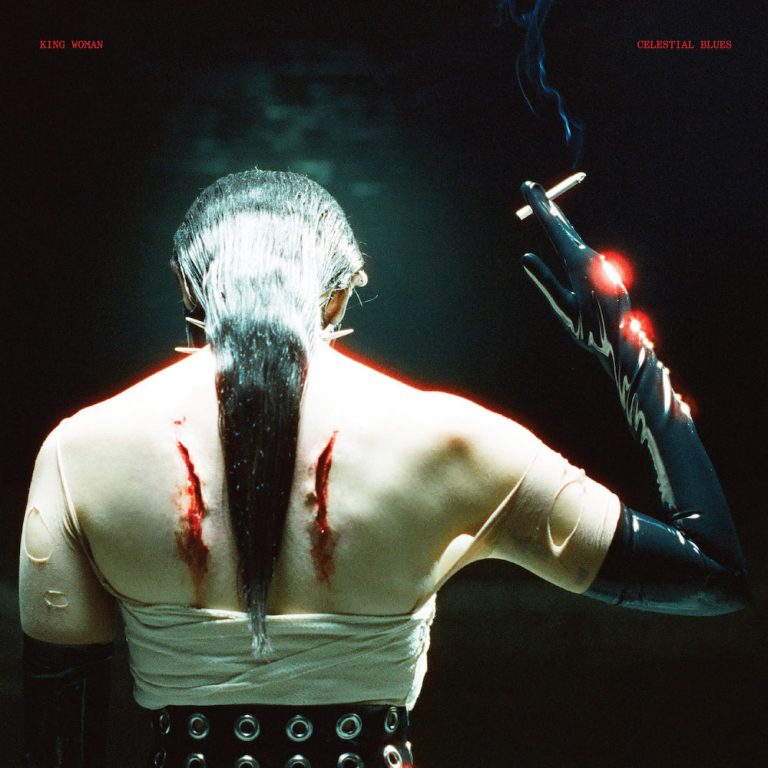Every mystic, no matter how immersed in textual and institutional prescriptions, is seeking a direct relationship with the absolute. Over decades, the perspective and plight of the mystic – yen for transcendence compromised by tethers of the body and egoic mind – have been loosely woven into popular music, most overtly in the blues and metal genres. In recent years, Chelsea Wolfe, Lingua Ignota, A.A. Williams, Backxwash, and Kristina Esfandiari of King Woman, among others, have each in their own way assumed the mystic’s orientation, situating their voice and lyrics within mercurial and frequently unsettling atmospheres. The result is a collection of female-fronted work that vividly and vulnerably portrays the psyche as a battleground for what we’ve been conditioned to regard as oppositional energies (good/evil, mind/flesh, knowledge/instinct). One might argue that the above-mentioned artists embrace sufficiently similar perspectives, thematic elements, and ambivalent tones to indicate the existence of a distinct albeit broad subgenre.
Over the past eight or so years, Kristina Esfandiari has mined dreampop and doom-pop templates via her other persona Miserable, most notably on 2016’s Uncontrollable. Her 2018 collaboration with Darcy Baylis, Love Addict, delved into wistful and dance-y electronica. Her first full-length album under the King Woman moniker, 2017’s Created in the Image of Suffering, featured sonorous instrumentation, confessional lyricism with an alt-biblical tone, and riveting vocals. Whether mining pop or heavier templates, Esfandiari consistently conveys the dynamics of mystical (and sexualized) desire vs. unfulfillment, navigating the Petrarchan notion of elusive love, whether that love is directed toward another human or an absolute source, such as God and/or Lucifer.
King Woman’s new album, Celestial Blues, builds on the best aspects of Suffering. Its austere segments are hypnotically spacious. Likewise, the layered, noisy, and hyper-dramatized parts of Blues are sublimely arresting. Significant, too, is the project’s elegant production, courtesy of Jack Shirley, who also produced Suffering (and Deafheaven’s first four albums). While Suffering captured an unpolished, live, occasionally lo-fi-ish feel, Blues is a more strategically produced studio venture, a sonic segue that proves integral to the album’s success. Instrumentation is expansive, crisp, and meticulously mixed while still sounding organic. Esfandiari’s voice, even when soaked in reverb, is stunningly nuanced. Blues represents an essential step for King Woman and Esfandiari, melding precision and spontaneity.
“Morning Star” highlights Esfandiari’s affinity for melancholy vocals and seductive melodies. Joey Raygoza, whose drumming on Suffering was proficient yet not necessarily memorable, operates on Blues as the core of the band, his contributions defining the project’s timbre. “I was luminous / my name is Lucifer,” Esfandiari sings, offering a first-person narration re Lucifer’s fall from heaven, though more pressingly employing the storyline to channel her own protest against arbitrary social and moral norms, including the suppression of women, particularly minority women, and female sexuality. The track ends with Peter Arensdorf’s heavily distorted guitar splashing over Esfandiari’s voice as she anthemically repeats, “Lucifer falling from the heights.”
“Boghz” oscillates between ambience and cacophony as Esfandiari considers the “love as a drug” motif, love being referenced carnally and mystically. She offers a portrait of a person addicted to the jolt or uplift that at least temporarily frees one from the ordinary, those fleeting moments of union with the transcendent. “Golgotha” makes exemplary use of soft-loud dynamics and offers an infectiously doom-filled melody. “It never ends,” Esfandiari repeats throughout the song, pointing to the tug-of-war between heaven and hell, a cosmic polarization that manifests in myriad ways within the human psyche. Raygoza’s drum part adrenalizes the track as Arensdorf’s guitar slices across the soundscape.
“Coil” is a punk/90s-indebted track, while “Entwined” displays the influence of sludge and stoner metal. The instrumentation drags, pulling against Esfandiari’s vocal to create a sonic tension. “I’ve been banished from the sky,” she sings on “Psychic Wound”, again using the Lucifer story as a vehicle to express resonance with the notion of exile, a welter of guitars, bass, and drums converging on her voice. The album closes with “Paradise Lost”, a tribute to Milton’s epic, which describes the fall of Lucifer and humankind, and portrays the ongoing clash between God’s compliant and Lucifer’s rebellious angels. “Thrown from our intimacy,” Esfandiari sings, “it’s just the saddest story.” In this way, she concludes the project by emphasizing the theme of disconnection, particularly between creator and the created.
King Woman perfects the approaches outlined on Suffering here, constructing soundscapes that are gossamer and pummeling, sparse and layered, heavenly and apocalyptic. Esfandiari hones the persona explored on prior releases, channeling the aspirations and ambivalences of the mystic. With Celestial Blues, she presents herself as one of the chief proponents of metal informed by spiritual inquiry, yearning for emancipation from the habituated self, and the complex desire that exceeds convention. She’s a modern-day gnostic.


